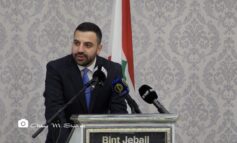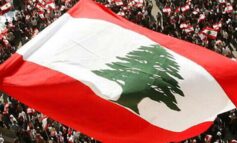
BEIRUT (IPS) — In the dark streets across from the main Hamra road, one of the major commercial arteries in the Lebanese capital Beirut, light streams from behind the drapes of a first floor apartment. A politician’s speech blaring from a TV resonates loudly in the night. As music cues the closing credits of the show, sudden celebratory gunfire from the political figure’s supporters erupts outside.
Elsewhere in the city, drivers are gruffly shooed to the side of the street by armed bodyguards sticking their heads out of tinted windows to allow for a convoy of similarly tinted SUVs carrying some politician to speed through traffic.
Welcome to the world of Lebanese political superstars.
Politicians in Lebanon are quite a breed. They have occupied the political stage for decades, waged wars and stumbled from one blunder to the other, causing many deaths in the process (the death toll during the 1975-1990 civil war was in the hundreds of thousands, while an estimated 67 people lost their lives during the recent civil conflict in May). Yet, these politicians, many still in power after decades, are still adored by a population drawn along confessional lines.
When they make speeches on TV, their followers celebrate with gunfire in the streets, regardless of the implicit danger to passers-by. According to the local French daily L’Orient Le Jour, residents Sonia Saade, Fady Ahmad Diab, Bassam Mohamad Misdi are all recent victims of stray bullets from celebratory gunfire.
Teenager Ahmed Ali al-Sahili was killed by a stray bullet following a speech by Lebanese Prime Minister Fouad Siniora Mar. 28. On May 25, 16 people were wounded in Beirut during clashes between opposing majority and opposition groups as well as by celebratory gunfire when opposition Hizbullah leader Hassan Nasrallah delivered his speech commemorating the 2000 Israeli withdrawal from southern Lebanon.
The sound of firing, however, is not the only tribute to the stardom status politicians enjoy in Lebanon.
During the consecutive 19 parliament sessions since November 2007 that failed to elect a president (prior to the appointment of Michel Suleiman in May), Beirut’s busy main streets were cordoned off, as bullet-proof cars of Lebanese MPs drove by at full speed, their sirens blasting, machine-guns pointed out from the windows directed at passers-by. This has caused massive traffic jams for the past year in the Lebanese capital.
“Fortunately, the session was held on a Sunday (May 25), which is a slower day for us drivers,” says taxi driver Brahim. “However, I have been stuck in traffic previously numerous times, especially on the seafront drive (where a number of MPs were previously residing at a hotel). With the current soaring gas prices, I, as well as other taxi drivers, can barely make ends meet every time our politicians agree to finally convene.”
Other streets, such as those in the posh Verdun area, are blocked frequently. “Lebanese parliamentary speaker Nabih Berri uses this road to return to his palace, which is located at the end of the street. His bodyguards often shoot in the air to speed up his motorcade’s advance,” adds Brahim.
Large areas of Beirut have been turned into private citadels by political leaders fearing for their safety, especially after the streak of bombings and assassinations that have been targeting politicians since 2005. The “security square” in the southern suburb of Dahiyeh, a Hizbullah stronghold, is off-limits to anyone without proper identification. Berri’s luxurious residence in Verdun is completely blocked off, as is the Koraytem mansion of Sunni Future Movement leader Saad Hariri.
Mohamad Bahlawan, who owns a grocery store in the vicinity of Hariri’s residence, says his business has gone down by more than 50 percent due to security measures imposed by the palace guards. “Many stores simply had to close their doors,” he says. Bahlawan adds that politicians’ cronies also often mimic their leaders’ behavior, ignoring residents’ grievances, and addressing them with arrogance.
This tradition is strong among high ranking employees of various politicians. At the Lebanese parliament, public relations head Mohamad Ballout has the authority to admit accredited journalists into the House to cover sessions or to deny them entry, based solely on his discretion, resulting in blatant discrimination against certain media or persons.
Paul Tabar, sociology professor at the Lebanese American University, says that the cult, which allows for such deviance from the democratic norm, is based on a theological relationship between followers and their leaders, and a subservient and obedient approach to a community or party figurehead.
“This state of affairs usually exists in pre-modern societies that are built on religion. Today in Lebanon, this has translated into political leaders posing as the sole interpreters of a religion or belief — hence the Zaim, or feudal lord in Arabic, is perceived as uniquely inspired and boasting special capabilities.”
As followers blindly submit to their leaders, they empower political figures and render them immune to accountability. “The words of leaders, especially when a religious connotation is added to the equation, can’t be questioned, as they represent the word of God,” says Tabar.
In a land where politicians are superstars, God does not seem to have much weight in the political game.





Leave a Reply